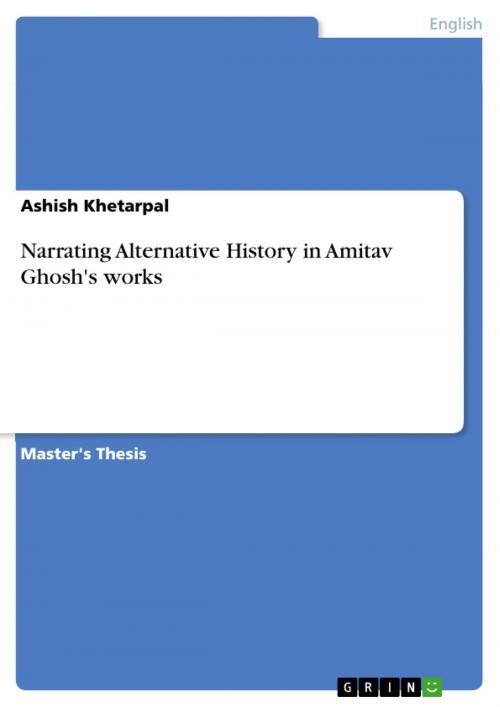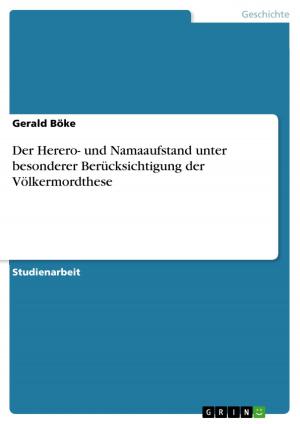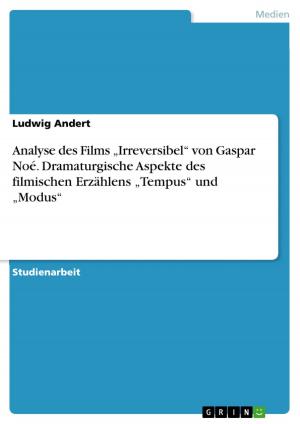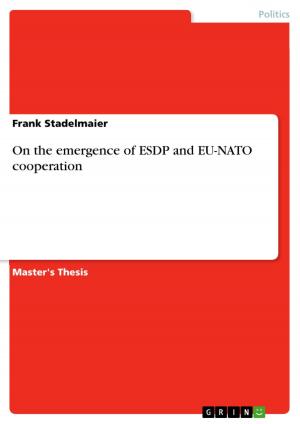Narrating Alternative History in Amitav Ghosh's works
Fiction & Literature, Literary Theory & Criticism, British| Author: | Ashish Khetarpal | ISBN: | 9783668267367 |
| Publisher: | GRIN Verlag | Publication: | August 3, 2016 |
| Imprint: | GRIN Verlag | Language: | English |
| Author: | Ashish Khetarpal |
| ISBN: | 9783668267367 |
| Publisher: | GRIN Verlag |
| Publication: | August 3, 2016 |
| Imprint: | GRIN Verlag |
| Language: | English |
Master's Thesis from the year 2016 in the subject English Language and Literature Studies - Literature, grade: 15/20, University of Rennes 2, course: Master Arts, Lettres, Langues,, language: English, abstract: The need to revise history is underlined by the fact that, with the passing of time, new facts and interpretations continue to come to the surface and demand integration. Revisionist historians use them to question or challenge the epistemological status and cultural function of historical thinking. The main purpose is to be able to give a new perspective on the nature and function of historical knowledge. The enterprise of revising history may follow a somewhat visionary path in its aim to search for newer perspectives, but it has nonetheless a historical basis. Departing from the said basis, the author-historian seeks to question, deny or challenge a historical event or its narration, and contravene the collective memory of society. Hayden White opines that, in the twentieth century, many historians and philosophers have 'cast serious doubts on the value of a specifically 'historical' consciousness, stressed the fictive character of historical reconstructions, and challenged history's claims to a place among the sciences' . In other words, the objective truth in history has come to be taken as a result of subjective representation. With political, economic and military dominance, the West overtook the world and initiated an era of imperialism. The imperial regime had created a divide between the East and the West through the latter's patronizing attitude towards the non-Western subject. Even though Amitav Ghosh does not consider himself as a postcolonial writer, his works nonetheless problematize the dominant position of the West and offer a possibility to construct an alternative history. Like revisionist historians, he bases his works on actual historical facts that form part of collective memory. He inserts the part of history that has not been deemed to be important by the Western historians.
Ashish Khetarpal was born in Meerut, India. He holds a honors degree in English Literature from the University of Panjab and a research degree in English Literature from the University of Rennes 2. He has worked as a language teacher in West France for several years and divides his time between India and France. A polyglot, he has traveled extensively in West Europe and has authored two books.
Master's Thesis from the year 2016 in the subject English Language and Literature Studies - Literature, grade: 15/20, University of Rennes 2, course: Master Arts, Lettres, Langues,, language: English, abstract: The need to revise history is underlined by the fact that, with the passing of time, new facts and interpretations continue to come to the surface and demand integration. Revisionist historians use them to question or challenge the epistemological status and cultural function of historical thinking. The main purpose is to be able to give a new perspective on the nature and function of historical knowledge. The enterprise of revising history may follow a somewhat visionary path in its aim to search for newer perspectives, but it has nonetheless a historical basis. Departing from the said basis, the author-historian seeks to question, deny or challenge a historical event or its narration, and contravene the collective memory of society. Hayden White opines that, in the twentieth century, many historians and philosophers have 'cast serious doubts on the value of a specifically 'historical' consciousness, stressed the fictive character of historical reconstructions, and challenged history's claims to a place among the sciences' . In other words, the objective truth in history has come to be taken as a result of subjective representation. With political, economic and military dominance, the West overtook the world and initiated an era of imperialism. The imperial regime had created a divide between the East and the West through the latter's patronizing attitude towards the non-Western subject. Even though Amitav Ghosh does not consider himself as a postcolonial writer, his works nonetheless problematize the dominant position of the West and offer a possibility to construct an alternative history. Like revisionist historians, he bases his works on actual historical facts that form part of collective memory. He inserts the part of history that has not been deemed to be important by the Western historians.
Ashish Khetarpal was born in Meerut, India. He holds a honors degree in English Literature from the University of Panjab and a research degree in English Literature from the University of Rennes 2. He has worked as a language teacher in West France for several years and divides his time between India and France. A polyglot, he has traveled extensively in West Europe and has authored two books.















